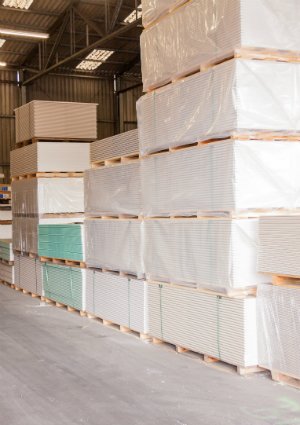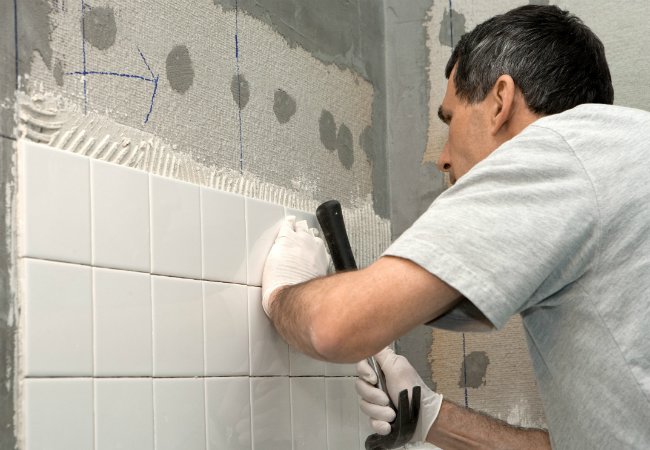We may earn revenue from the products available on this page and participate in affiliate programs. Learn More ›
Do-it-yourself types depend on cement backer board for numerous projects, including tiled walls, flooring, and even countertops. Stronger than plywood and less susceptible to damage from rot, cement backer board makes for a reliable, more durable building material than wood. Its strength and cement construction, however, present more challenges than wood-based materials do when it comes time to do the cutting. Fortunately, equipped with the right tools, techniques, and a little patience, you can slice through this sturdy material.
Before You Begin
A word of caution before you begin: As with any home maintenance project, proper protection should be used when cutting cement backer board. Before you get started, be sure to don both eye goggles and a respirator mask. Cutting through the cement will produce dust that can be hazardous if you breathe it in or get it in your eyes.

METHOD 1: Score and Snap Thinner Sheets
One of the easiest techniques used to cut cement backer board is to score the sheet and then snap it along the cut line.
- Lay your cement board flat, and draw a line with a carpenter’s pencil where you intend to cut.
- Place a straightedge along the line and drag either a drywall utility knife or a scoring tool against it.
- Repeat your cuts two to three times to make them deeper, which will make snapping the board easier.
- Once you’ve finished your cuts, stand the board up and press your knee behind the line you’ve scored; a little pressure will cause the section of the board to split, leaving the fiberglass mesh intact.
- Cut the connecting mesh apart using a utility knife.
METHOD 2: Cut Straight Lines with a Circular Saw
For cuts that are a little more smooth and efficient, turn to power tools. Circular saws, while more often used to cut wood, can also make quick and clean cuts in cement board—and are often conveniently on hand in the workshops of DIY-savvy homeowners. Fit your circular saw with a carbide-tipped wood-cutting blade (view example on Amazon), choosing one with as few teeth as possible in order to minimize the amount of dust given off as you saw. Operate your circular saw as you typically would, pushing it slowly and evenly through your cement backer board.
METHOD 3: Punch Out Circles with Power Tools
For DIYers in need of small circular holes for wiring or piping, there are a couple of tool options.
MASONRY BIT
One method involves using an electric drill fitted with a masonry bit. Since masonry bits come in a variety of sizes, it is easy to pick one up in the exact size needed.
Simply attach the bit to the drill, mark with a carpenter’s pencil the area that needs to be cut, and drill the bit into the cement board. With a little pressure, the bit will cut its way through the backer board.
JIGSAW
A jigsaw fitted with a metal-cutting blade or carbide-grit blade can produce larger rounded cuts in addition to standard straight cuts.
When utilizing a jigsaw for the job, it’s important to first mark the board with a carpenter’s pencil for guidance. Start the process by drilling a hole with a masonry bit, then use the jigsaw to expand it and continue the work.
While cutting round holes with a jigsaw is more challenging than using a masonry bit, the process allows for a more custom hole size.


